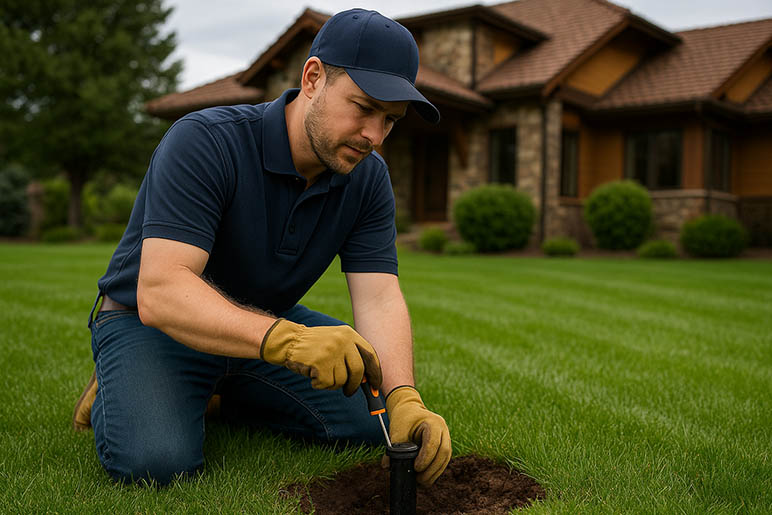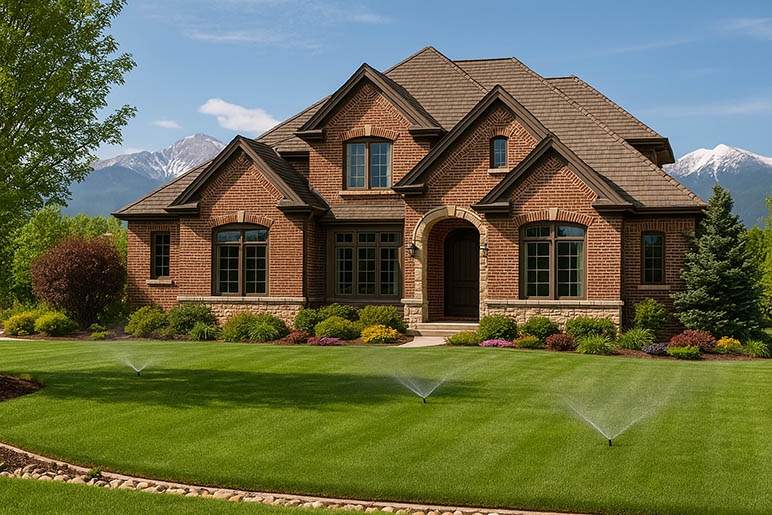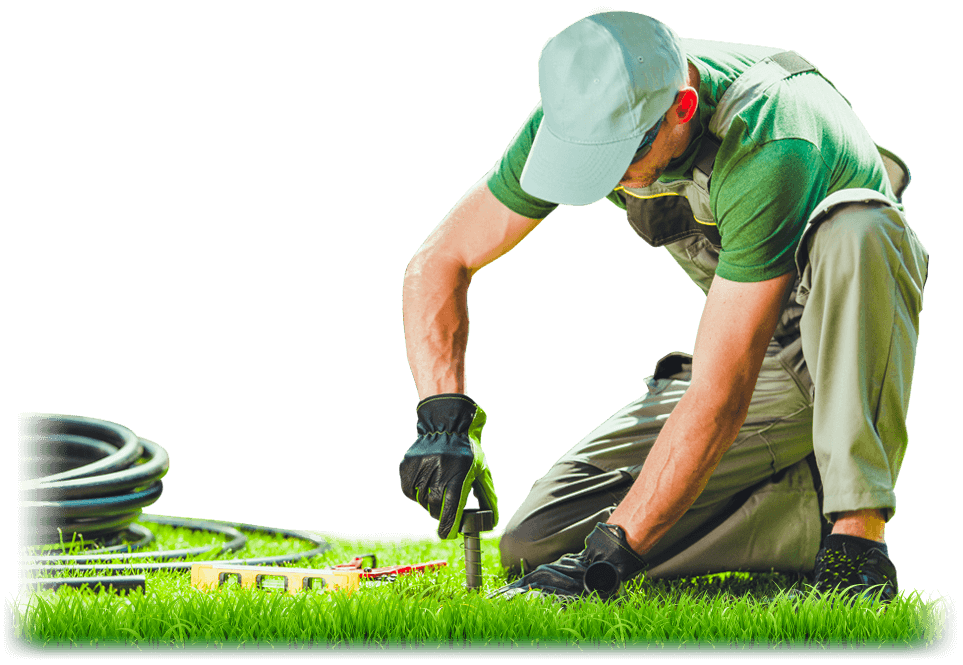
CS Sprinklers
Hire A Professional Sprinkler Company
When you hire a professional sprinkler company, you’re getting a hassle-free lawn ready for summer.
Denver’s altitude changes how lawns hold water. Learn why your grass dries out faster and how to adjust your sprinkler system for better results.
Living a mile above sea level comes with a lot of perks—great views, clean air, and fewer bugs, for starters. But when it comes to lawn care, Denver’s high elevation brings a few challenges that people at lower altitudes just don’t have to deal with. Chief among them is how quickly water evaporates. Whether you’re running sprinklers or watering by hand, your lawn is going to lose moisture faster here than in most other places. At CS Sprinklers, we’ve worked with yards all across the Front Range, and we’ve seen firsthand how altitude affects everything from soil health to water usage.
At higher elevations like Denver’s 5,280 feet, the air is thinner, and the atmospheric pressure is lower. That means there’s less moisture in the air, so water evaporates more quickly from your lawn’s surface. Add in strong sunlight and occasional wind, and you’ve got a recipe for dry, stressed grass, even if you’re watering regularly. We often hear from homeowners who are running their sprinklers the same way they did in another state—only to find dry patches and weak spots all over their lawns. The reality is, your system needs to work smarter up here, not just harder.
That’s why watering technique matters so much in Denver. It’s not just about how often you water—it’s about when and how deeply. Shallow, frequent watering may seem like a good idea when things look dry, but it often leads to weak roots and water waste due to fast evaporation. Deep, infrequent watering helps your lawn build a stronger root system, which is crucial in our dry climate. But to get that right, your sprinkler system has to be properly zoned, timed, and adjusted to work with the unique demands of high-altitude living.
Denver’s elevation also affects the soil, which plays a big role in how your lawn absorbs water. The soils in our area tend to be clay-heavy or sandy, depending on your neighborhood. Clay holds water but drains slowly, which means you can’t blast it all at once without risking runoff. Sandy soil drains too quickly, so water doesn’t stick around long enough to be useful unless you water in shorter cycles spaced out over time. Knowing your soil type is the first step in figuring out the best watering schedule—and that’s something we help customers with all the time.
Another thing folks don’t always consider is the impact of UV exposure at higher altitudes. In Denver, the sun’s rays are stronger, which accelerates evaporation and puts more stress on plants and turf. Your lawn isn’t just losing water through the soil—it’s also sweating it out through the blades. This means you need to water earlier in the day before the sun is high overhead. We always recommend watering before 10 a.m. when conditions are cooler, and the wind is calmer. Watering at night can also work, but it carries a higher risk of fungus if your lawn doesn’t dry out fast enough.
Wind is another key factor at this elevation. Even on days that don’t feel especially gusty, a steady breeze can suck moisture right out of your lawn and cause sprinkler spray to drift. That means less water gets where it’s supposed to go, and more ends up evaporating or hitting the sidewalk. If your sprinkler heads aren’t properly adjusted or you’re using outdated nozzles, you could be losing a surprising amount of water to the wind. We often upgrade customers to high-efficiency nozzles that deliver larger droplets that are less likely to get blown away.
So, what can you do to make your watering system more effective in Denver’s altitude? First, get your zones tuned up. Make sure each zone is watering an area with similar sun exposure and plant type. Don’t group shaded grass and full-sun areas together on the same schedule—they have different needs. Next, audit your system for coverage and pressure. Heads that are too close, too far, or poorly aligned can cause dry patches and overwatered areas. Finally, consider upgrading to a smart controller. These modern systems use local weather data to adjust watering schedules automatically, which can save water and keep your lawn healthier throughout the season.
At CS Sprinklers, we also recommend seasonal adjustments. Spring watering doesn’t need to match summer schedules, and fall should be dialed back even more. A good rule of thumb is to start light in early spring, ramp up in mid-summer when things get hot and dry, and then taper off as the temperatures drop in September. This seasonal strategy works hand in hand with our local climate and helps reduce overwatering, which is a common issue in Denver. Too much water can actually harm your lawn and lead to fungus, rot, or wasted runoff.
We’ve also found that adding mulch around trees and garden beds helps keep the soil cooler and prevents water loss. While your sprinkler system handles the turf, drip lines and mulch help your shrubs, flowers, and veggies hold onto their moisture better. For raised beds or xeriscape areas, we can install drip irrigation zones that target plants more precisely—another smart move in high-altitude environments where every drop counts. Combining different irrigation methods tailored to each zone gives your landscape a good chance to thrive in our dry, sunny conditions.
The biggest takeaway? Denver lawns require a different approach. You can’t treat your yard like it’s in Kansas City or San Diego. Our altitude demands a system that’s well-planned, properly maintained, and responsive to the unique climate challenges we face here. The good news is, once it’s set up right, your lawn can look just as lush and green as any lower-altitude neighbor’s—without using twice as much water to get there. It’s all about working with the environment, not against it.
Need help getting your system adjusted for Denver’s altitude? CS Sprinklers has you covered. From smart upgrades to seasonal tune-ups, we know what works up here—and what doesn’t. Give us a call and we’ll help your system run better, use less water, and keep your lawn looking healthy year-round.
Give us a call today at (303) 627-4190 or email us at sprinklers@cssprinklers.com.


“C S Sprinklers came out and repaired my sprinklers system fast and now they work GREAT!!”
“I needed help winterizing my sprinklers so I called CS Sprinklers. They were super helpful.”

Go Green
Our Mission
Our hands-on ownership approach allows us to offer the very best service in sprinkler repair and maintenance. The professionals at CS Sprinklers are dedicated to ensuring your satisfaction. Our customers are our business and the strongest compliment we can receive is your referral to friends, family, and neighbors. With eco-friendly solutions, we’ll help keep Denver’s lawns green, reduce water waste, and help protect the planet for future generations.
Professional Service
Call the professionals at CS Sprinklers for prompt and professional service. With a complete range of irrigation services, we'll offer you the best products and service with highly competitive prices.
Quality Sprinklers
When you want the best sprinkler service and products available, call CS Sprinklers. We have the latest smart-watering features in today's state-of-the-art sprinkler equipment.
Sprinkler Installation
Whether you need a new system installed or have an existing system, you can trust the sprinkler professionals at CS Sprinklers to give you the best price and recommendations.
Irrigation Repair
The professionals at CS Sprinklers have the knowledge and expertise to repair any sprinkler or irrigation problem, keeping your lawn green and your plants thriving. Give us a call. We're ready to help you.
Fall Winterization
Call the sprinkler professionals you can trust to ensure your sprinkler system is ready for winter. With routine seasonal services offered, winterization and blowouts protect your underground pipes.
Spring Tune-Ups
After a long winter, your sprinklers should be properly inspected in the spring to check for leaks and to make adjustments to sprinkler heads and watering schedules. Call CS Sprinklers today!
If you have any questions about irrigation products or services, give the sprinkler professionals at CS Sprinklers a call today!